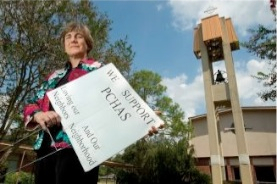 (Lisa Falkenberg, Houston Chronicle)
(Lisa Falkenberg, Houston Chronicle)
They sprout like weeds from carefully curated flower beds. They sway in the breeze in rhythm with mounted American flags and plastic baby swings dangling from ancient trees. The white protest signs that have for months littered the lawns of Meyerland have become a symbol of the philosophical divide afflicting this idyllic, 1950s-style deed-restricted neighborhood of 2,300 homes in southwest Houston.
The last line on the signs, “Love Thy Neighborhood,” cuts to the heart of a fight over a neighborhood church’s plans for an on-campus ministry serving seven single moms and their children. To some, it’s a clever turn of phrase encouraging preservation of an urban enclave where young families can still find affordable housing and good schools. To others, who have been far less vocal at meetings and in media coverage, it’s an abomination, turning on its head the Biblical message of caring for those least among us, exactly the kind of folks the ministry is intended to help.
“That’s what set me off, those signs,” says longtime Meyerland resident Gerda Gomez, a 73-year-old retired nurse and associate professor at UT Health Science Center. “To me, it means you’re in and all these people are out.”
Gomez, who moved to Meyerland in 1978, and fellow resident Lisa Gossett, who has lived in the neighborhood since 1989, say the angry, “Not In My Backyard”-style response from some neighbors has been an embarrassment, and by far a greater threat to their property values than the housing development St. John’s Presbyterian Church wants to build in partnership with Presbyterian Children’s Homes and Services.
“Meyerland is going to look really bad,” Gomez says. “Who wants to move to a bigoted community?”
Gossett, a 52-year-old associate professor of environmental management at the University of Houston-Clear Lake, says she has heard her neighbors refer to the single mothers in the project in vile terms, such as “parasites” who would take advantage of community resources and schools. Gossett fears young families looking for vibrant, diverse neighborhoods will turn to the Heights, or other communities they perceive as more open: “If we’re a neighborhood that’s perceived as being fear-mongering, unwelcoming, hypocritical, that’s not how I view our neighborhood. And that’s not how I want our neighborhood presented.”
(Read more of the story at the Houston Chronicle)
LOCAL AREA HEADLINES:
- West Nile Virus in Houston Nearly Gone (KUHF Public Radio)
- Young Undocumented Immigrants Apply For Temporary Work Permits (KUHF Public Radio)
- Houston Focused On Controlling Syphilis, HIV (KUHF Public Radio)
- Galveston agrees on plan for public housing (AP)
- Are cell phones putting local honey bees out of service? (KRIV 26 News)
- Medical pioneer tackles new projects as he nears 100 (Houston Chronicle)
- Gay bashing killer denied parole (KPRC 2 News)
- Scouts’ Camp Strake is on the market (Houston Chronicle)
STATE, NATION & WORLD:
- Educators want tools to meet their mission (Houston Chronicle)
- In Texas Conviction, an Immigrant Rallying Cry (New York Times)
- Four Texas counties among nation’s top 10 in gas consumption (Houston Chronicle)
- Ole Miss reflects on the 50 years since integration (USA Today)
- Supreme Court to delve into more divisive issues (USA Today)
- A Peace Corps For Doctors, Built By A Senator’s Daughter (NPR)
- After Decades in Institutions, a Bumpy Journey to a New Life (New York Times)
- Potentially Deadly Virus Related to SARS Appears Not Easily Spread (New York Times)
